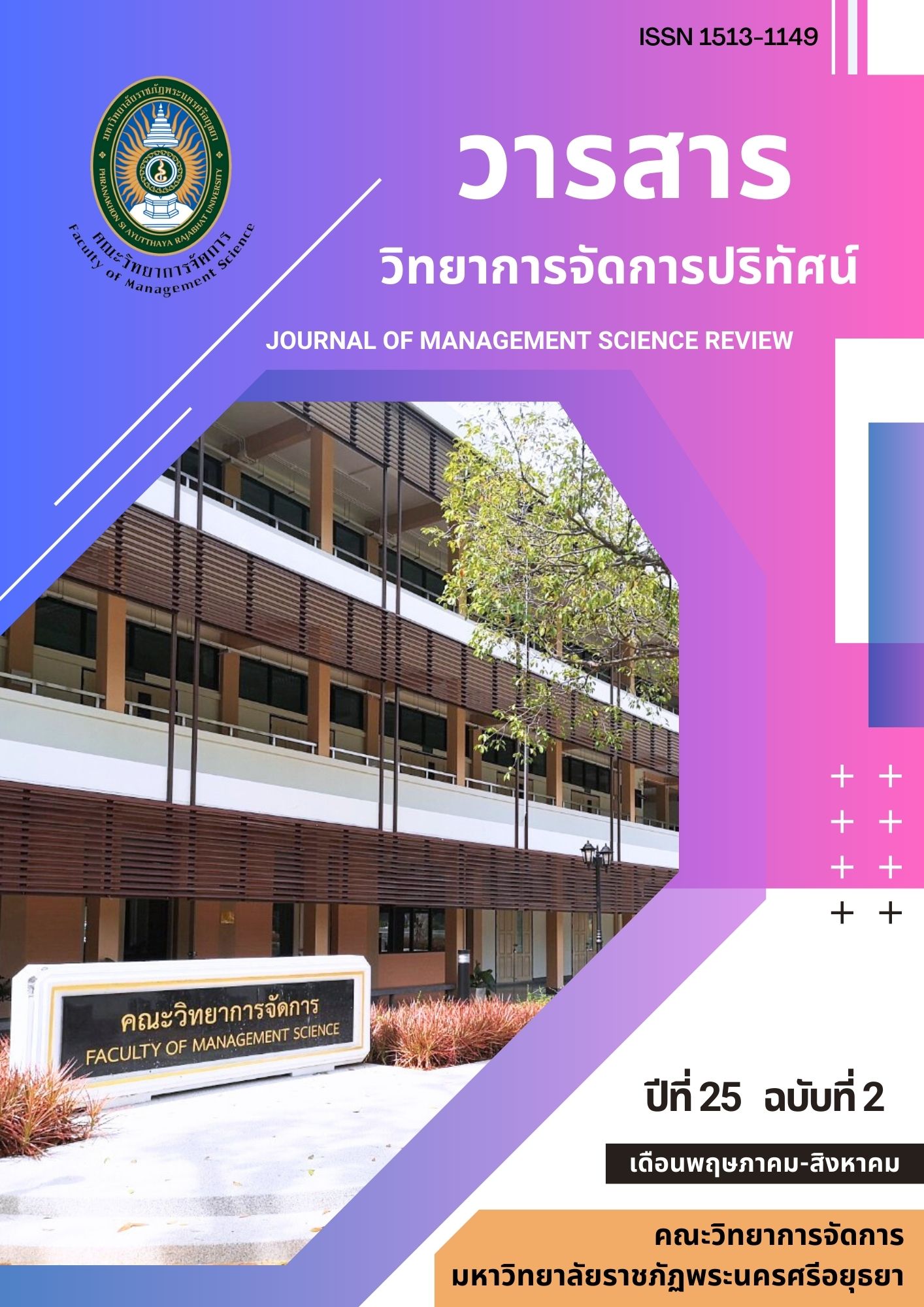Technology Acceptance and Online Consumer Behavior Affecting Decision making process Via Facebook Messenger Bots
Keywords:
Technology Acceptance, Online Consumer Behavior, Decision-Making Process, ChatbotAbstract
The objective of this research was to study the acceptance of technology and online consumer behavior that influences purchasing decisions through Facebook shop chatbots. This study was a quantitative study using a survey research method. The sample was 400 Facebook users in Thailand who have experience buying products through chatbots on Facebook shops, selected by Snowball Sampling. The data tool was an online questionnaire. The statistics used in the preliminary data analysis were descriptive statistics, including frequency, percentage, mean and standard deviation, while the reference statistics used to test the hypothesis were Pearson correlation statistics and multiple regression analysis.
The results of the study of technology acceptance and online consumer behavior affecting the decision-making process via chatbot on Facebook shops revealed that most of the respondents were female, under 21 years of age, and had below bachelor's degree. Most of them were single and being as students with an average monthly income of less than 15,000 baht. The results of the hypothesis test showed that the acceptance of technology and online consumer behavior affects purchasing decisions via chatbots of Facebook shops in a positive tendency with a statistical significance of .05. In addition, technology acceptance and online consumer behavior could also forecast the decision-making process via Facebook shops chatbot with a statistical significance of .05, which could predict the tendency of purchasing decisions at 52.10 percent, whose prediction equation model was Y= 1.17+ .34A+.37B
References
กนกวรรณ กลับวงศ์. (2562). พฤติกรรมผู้บริโภคออนไลน์ การยอมรับเทคโนโลยี และส่วนประสมทางการตลาดที่มีอิทธิพลต่อการตัดสินใจซื้ออัญมณีเครื่องประดับผ่านสื่อออนไลน์. วิทยานิพนธ์มหาบัณฑิต, มหาวิทยาลัยกรุงเทพ.
ชัชพัชร์ เตชะเกษมสุข. (2563). การยอมรับเทคโนโลยีและการสื่อสารการตลาดดิจิทัลที่มีผลต่อการตัดสินใจซื้อรองเท้าออนไลน์ของผู้บริโภค Generation X ในเขตกรุงเทพมหานคร. วิทยานิพนธ์นิเทศศาสตรมหาบัณฑิต สาขาวิชาการสื่อสารการตลาดดิจิทัล, มหาวิทยาลัยกรุงเทพ.
ณัฏฐนันท์ พิธิวัตโชติกุล. (2560). การยอมรับเทคโนโลยีโทรศัพท์มือถือ การตลาดผ่านสื่อสังคมออนไลน์ และพฤติกรรมผู้บริโภคออนไลน์ที่ส่งผลต่อความตั้งใจซื้อสินค้าออนไลน์ผ่านแอปพลิเคชันของผู้บริโภคในกรุงเทพ. การค้นคว้าอิสระบริหารธุรกิจมหาบัณฑิต, มหาวิทยาลัยกรุงเทพ.
พีรวัส ปทุมุต์ตรังษี, จรูญ ชำนาญไพร และ เบญจฐา วัฒนกุล (2566). การยอมรับเทคโนโลยีที่มีผลต่อการตัดสินใจซื้อสินค้าออนไลน์ของวัยรุ่น ในอำเภอปากเกร็ด จังหวัดนนทบุรี. วารสารนวัตกรรมการจัดการศึกษาและการวิจัย, 5(1), น.1-12.
ภัสรวดี จันทรีเล็ก, สมบูรณ์ ศรีอนุรักษ์วงศ์, และประภัสสร วิเศษประภา. (2562). ปัจจัยที่มีอิทธิพลต่อการตัดสินใจเลือกซื้อแผนบริการสมาชิกของแอปพลิเคชันวิดิโอสตรีมมิ่งเน็ตฟลิกซ์. วิทยานิพนธ์บริหารธุรกิจมหาบัณฑิต, มหาวิทยาลัยรามคำแหง.
วรรณิกา จิตตินรากร. (2561). การยอมรับเทคโนโลยีและพฤติกรรมผู้บริโภคออนไลน์ที่มีอิทธิพลต่อการตัดสินใจซื้อสินค้าจากบริษัทขายตรงผ่านช่องทางออนไลน์. การค้นคว้าอิสระบริหารธุรกิจมหาบัณฑติ สาขาวิชาบริหารธุรกิจ, มหาวิทยาลัยกรุงเทพ.
ศศิมา สุขสว่าง. (2562). การบริการและคุณภาพบริการ. กรุงเทพฯ: เอชซีดี อินโวเวชั่น.
สมฤทัย ปรารถนาพิทักษ์. (2557). หลักการตลาด. นครปฐม: ศูนย์ส่งเสริมวิชาการ.
สุธาสินี ตุลานนท์. (2562). การยอมรับเทคโนโลยีที่มีผลต่อการตัดสินใจซื้อสินค้าออนไลน์ของผู้สูงอายุ. วิทยานิพนธ์บริหารธุรกิจมหาบัณฑิต, มหาวิทยาลัยนเรศวร.
อนาวิล ศักดิ์สูง, อัศนีย์ ณ น่าน และ ฑัตษภร ศรีสุข. (2566). การยอมรับเทคโนโลยีโทรศัพท์มือถือและพฤติกรรมผู้บริโภคออนไลน์ที่มีอิทธิพลต่อการเลือกใช้บริการสั่งอาหารผ่านทางแอปพลิเคชันของผู้บริโภคในจังหวัดลำปาง. วารสารวิจัยมหาวิทยาลัยเวสเทิร์น มนุษยศาสตร์และสังคมศาสตร์, 6(3), 162-174.
Chu, A. Z-C., & Chu, R. J-C. (2011). The intranet’s role in newcomer socialization in hotel industry in Taiwan-technology acceptance model analysis. The International Journal of Human Resource Management, 22(5), 1163-1179.
Davis, F. (1985). A technology acceptance model for empirically testing new end-user information systems: theory and results. Doctoral Dissertation, MIT Sloan School of Management Cambridge.
Guarda, T., Augusto, M.F. (2022). ChatBots and Business Strategy. In Abraham, A., et al. Innovations in Bio-Inspired Computing and Applications. IBICA 2021. Springer, 419, from https://doi.org/10.1007/978-3-030-96299-9_53
Mitchell, T. M. (2006). The discipline of machine learning. Pittsburg: School of Computer Science, Carnegie Mellon University.
We are social & Hootsuite. (2021). Digital 2021. Retrieved January 29, 2022, from https://wearesocial.com/uk/blog/2021/01/digital-2021-uk
Yamane, T. (1973). Statistics: An Introductory Analysis. 3rd Ed. New York: Harper and Row.





